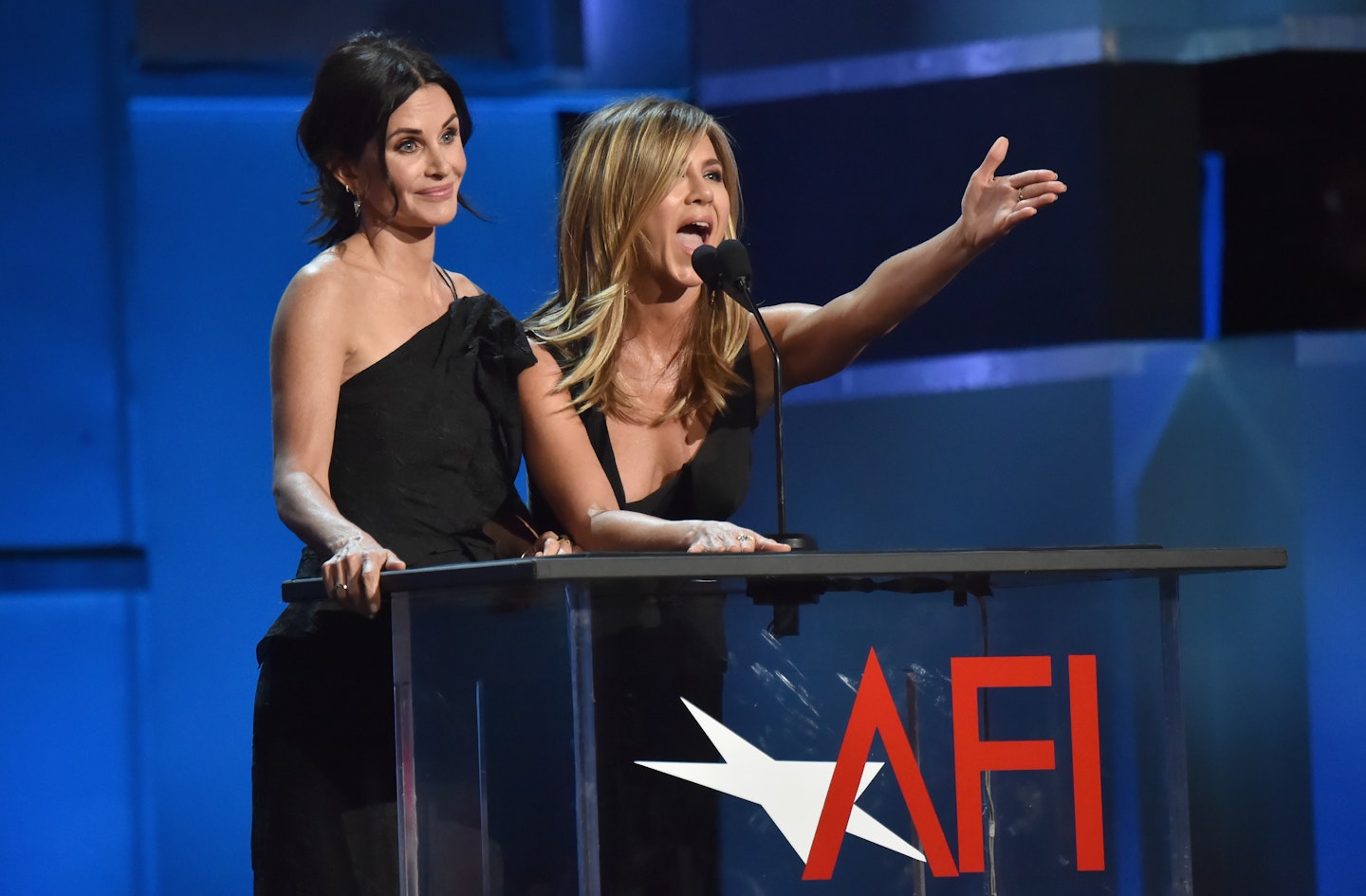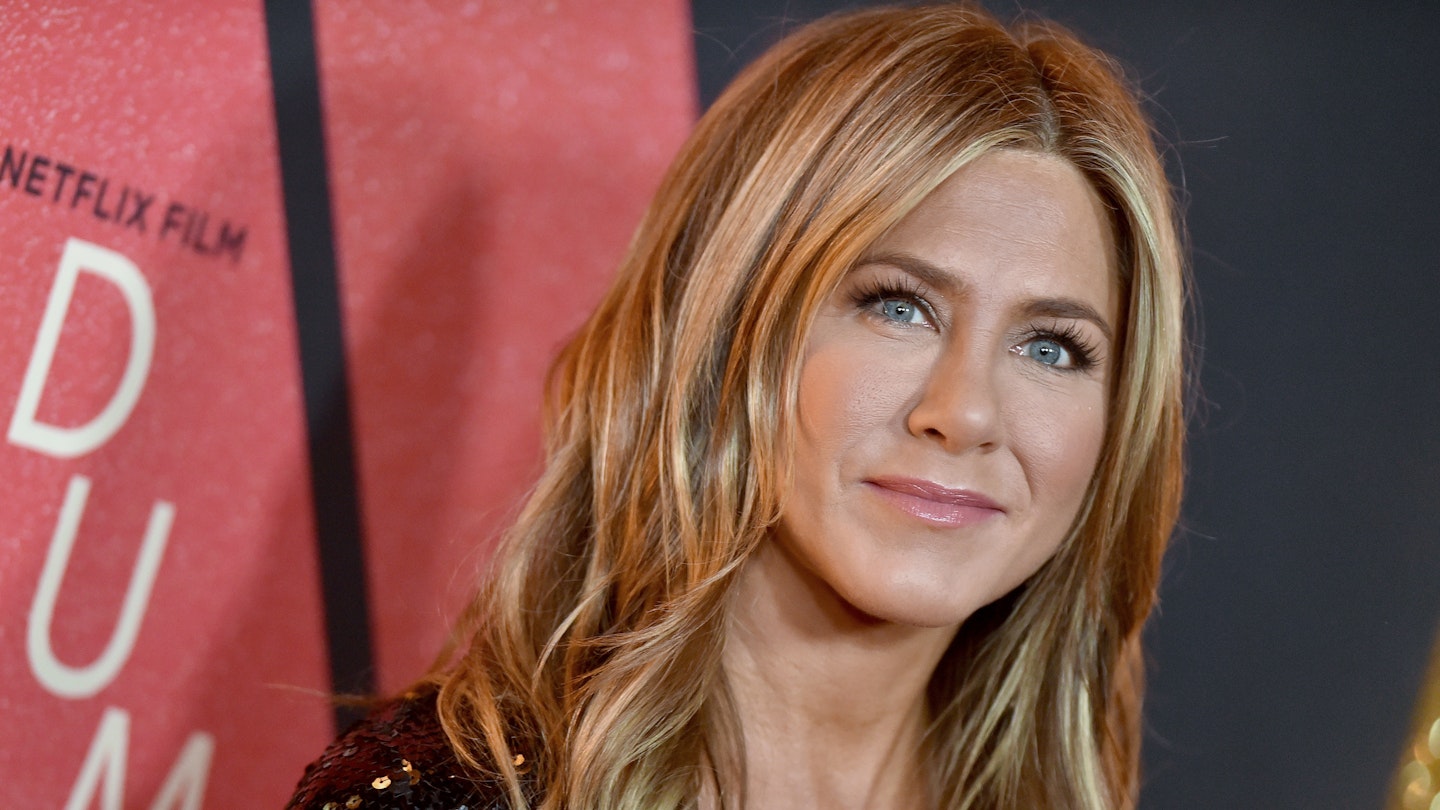UPDATE: It would be hard to love Jennifer Aniston anymore than we already do, but after her recent comments about feeling 'physically incredible' over turning 50 in InStyle, she's sent our crush to all-new heights. Speaking to the InStyle, Jen said 'Fifty was the first time I thought, ‘Well, that number,' she added 'I don’t know what it is because I don’t feel any different. Things aren’t shutting down in any way. I feel physically incredible.'
She also deconstructed the way that people talk about age in Hollywood (did we mention we love her?), remarking 'so it’s weird that it’s all of a sudden getting telegraphed in a way that’s like, "You look amazing for your age", I think we need to establish some etiquette around that dialogue and verbiage.' As for the accompanying shoot? Obviously you'll want to see the it in length (and enjoy a bit of Friends nostalgia. That giant 80s bow? So Rachel) so here they all are...
When Jennifer Aniston turned 50 in February, Hannah Betts wrote...
This month – on 11 February, in fact – actress, film producer, businesswoman, philanthropist andstyle icon Jennifer Anistonwill turn 50. One might expect the focus to be on what an incredibly successful half-century this has been, and how utterly sensational she looks on it. Instead,because the words ‘wife’ and ‘mother’ cannot be added to this list, from some quarters the reaction is likely to be – as it has typically been since Aniston separated from husband Brad Pitt some 14 years ago –a collective sigh of ‘poor Jen’rather than the ‘fantastic Jen’ she so justly deserves.
Among those of us who understand that a woman is more than her relationship and/ or procreative status, the response will not only be ‘change the record’ but also ‘read the room’. Society has changed, and the Jen An journey needs to change with it, as the actress herself has not been slow in demanding.
When Aniston and Pitt divorced back in 2005, we found ourselves mired in the post-Bridget Jones era, in which single women without children were stigmatised as a problem needing to be fixed; not least single women of – shriek! – middle age. And yet, the proportion of us without offspring has almost doubled since the ’90s, according to the Office for National Statistics, with one in five women of my 40-something generation remaining childless. Among those with degrees born between 1965 and 1978, the figure rises to 43%, prompting academics to theorise that, the more intelligent women are, the less likely they are to seek to reproduce. Either way, the manner in which we talk about women’s choices and women’s age has undergone a fundamental shift.
Grazia has long been part of this conversation. Jen became single again the year the magazine launched, and her repeated appearances on its cover have reflected the way in which its readers – and writers – have identified with her. We haven’t always covered ourselves in glory in this respect: at times, we too succumbed to the ‘poor Jen’ lament as she traversed the highs and lows of relationships with Vince Vaughn and John Mayer. Other publications proved even less woke on the matter. Only last year, when the actress split from second husband Justin Theroux, one national newspaper crassly inquired: ‘Why Can’t Jennifer Aniston Keep a Man?’, as if we had collectively been sucked back into the ’50s.

A couple of years before this, Aniston herself was so weary of playing the scapegoat for the world’s anxiety about single and/or childless women that she took to the pages of Huffington Post to say so. ‘For the record,’ our heroine declared, ‘I am not pregnant. What I am is fed up. I’m fed up with the sport-like scrutiny and body-shaming’ directed at her by ‘Is she, or isn’t she?’- obsessed bump watchers. She added that she had ‘grown tired of being part of this narrative’. ‘Here’s where I come out on this topic,’ she concluded. ‘We are complete with or without a mate, with or without a child... We don’t need to be married or mothers to be complete. We get to determine our own “happily ever after” for ourselves.’ To which I, and legions of other independent women, issued an amen.
Over the years, Aniston has become, as she put it, a ‘lens through which we, as a society, view our mothers, daughters, sisters, wives, female friends and colleagues’ Jen is the glowing embodiment of our cultural expectations, some super-taut Beverly Hills everywoman, the girl-next- door who is no less a Hollywood icon. Accordingly, in attempting to police her body and life choices, scrutinisers police all women, not least the millions of us across the globe who have rejected the roles that society traditionally prescribed for us.
She resonates with us because, while she takes one for the team on an epic scale, ultimately, we are all expected to take the same shit. Well, no more. As ever, Aniston embodies the zeitgeist, and the zeitgeist is evolving. Time’s Up not only on sexual harassment, but also on the micro- aggressions and petty chauvinisms that we have traditionally put up with. As she enters her sixth decade, Aniston is having the last laugh. She has a great career, great friends, a great life full stop. She is at the height of her powers: personal, creative, financial. Not only did she star in the world’s most successful sitcom, currently enjoying a revival among Gen Z Netflix viewers (recent research found that_Friends_was the streaming service’s favourite programme among those aged five to 16); she has also made over 30 films, with hot new projects ever pending. In 2017, she was ranked second on Forbes’ list of highest-paid actresses.
Poor, this woman is not. Personally, I adore Aniston. I love her not for her hair, or her body, nor any of the superficial trappings for which she has been lionised, but for her dignity, emotional intelligence and wit. When she speaks, it is with an authority that exposes those who feed off her supposed tragic status as the misogynist anachronisms they are. In fantastic Jen, we find a champion to silence such reactionaries.
Recently, she asserted: ‘We live in a society that messages women: by this age, you should be married; by this age, you should have children...Why do we want a happy ending? How about just a happy existence? A happy process? We’re all in process, constantly.’ For better or worse, Aniston’s process will continue to be public – and all of us will learn from it.
